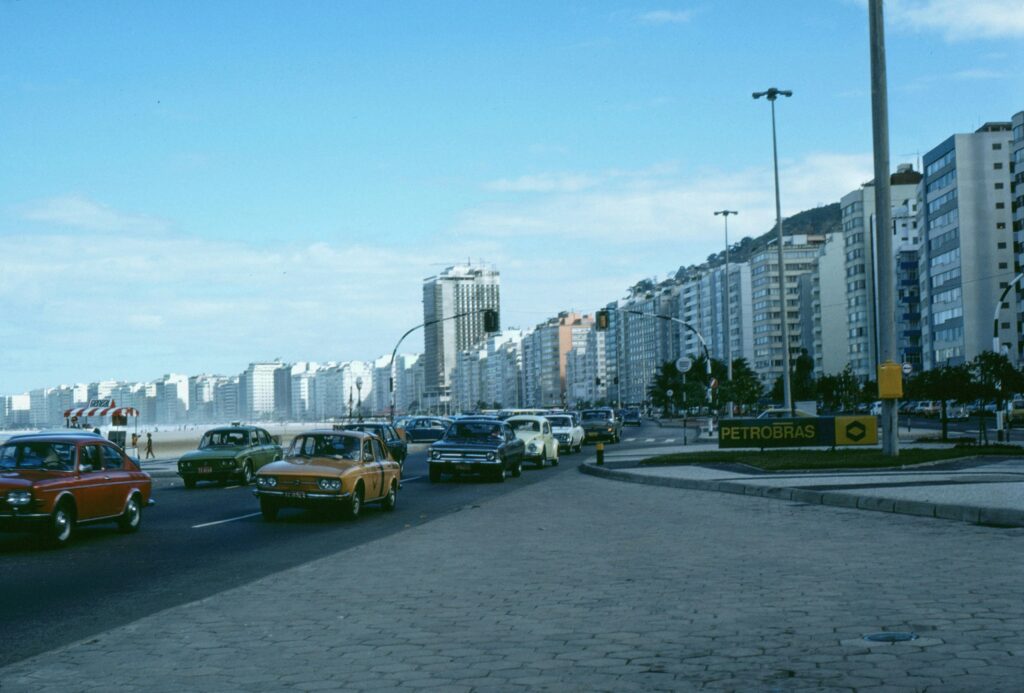Phone: WA: +54 9 3814 45-9254
📅 Post Date: September 10, 2025 | 🔄 Updated: February 6, 2026
Brazil’s Digital Nomad Visa
Brazil’s Digital Nomad Visa (VITEM XIV) enables foreigners who work remotely for foreign companies outside Brazil to reside legally in the country, without being employed by Brazilian companies.
In addition, this program allows experiencing Brazil’s lifestyle and infrastructure, without requiring a local employment contract for qualification. Holders can stay for up to one year (renewable).
- Type: Temporary Visa (Remote Work-based)
- Country: Brazil
- Duration: 1 year, renewable for another year.
Procedures
The immigrant must apply for a temporary visa or residence authorisation through the Brazilian consulate authorities abroad or the Ministry of Justice and Public Security if already in Brazil.
The initial residence authorisation is granted for up to 1 year, with the possibility of renewal for the same period, provided the conditions are maintained.
Estimate processing time after all documents for the application are duly obtained: 4-5 months
Eligibility Requirements for Brazil’s Digital Nomad Visa
To qualify for Brazil’s Digital Nomad Visa, applicants must meet the following eligibility requirements:
Must be employed by a company located outside Brazil or be self-employed with foreign clients. The applicant must provide a declaration confirming their ability to work remotely.
An employment or service contract with a foreign employer.
Proof of financial means from a foreign source, with a monthly income of at least USD 1,500, or proof of bank
funds totaling at least USD 18,000.
Proof of minimum monthly income between USD 1,500–2,000 (depending on current regulations).
Valid health insurance covering Brazil.
Cannot work for a Brazilian employer.
Documents Required for the Digital Nomad Program
Once eligibility is confirmed, applicants must also provide the following documents:
Valid Passport.
Non-Criminal Certificate
Employment contract with a foreign company OR proof of self-employment with international clients.
Bank statements or pay slips showing the required monthly income.
Health insurance policy valid in Brazil.
(For dependents) Marriage certificate, birth certificate, or proof of dependency (apostilled & translated).
Why Choose the Brazil Digital Nomad Visa?
Live in Brazil while working remotely: Perfect for professionals employed by foreign companies who want to experience life in Brazil.
Live in Brazil while working remotely: Perfect for professionals employed by foreign companies who want to experience life in Brazil.
Renewable visa: Initially granted for 1 year and renewable once, allowing a maximum stay of 2 years under the Digital Nomad Visa.
Freedom from Brazilian employment: Work for your foreign employer without restrictions, while enjoying the Brazilian lifestyle.
Pathway to Brazilian citizenship: can serve as a Permanent Residency in Brazil and eventual Brazilian citizenship, subject to eligibility and local requirements.
Invitation Letter & Digital Nomad Residence Package
If you need a Visitor Visa – Business or Tourism with an invitation letter for preparation to enter Brazil, we can assist you. After your arrival, we also provide legal support to apply for a Digital Nomad residence permit.
Please fill out the questionnaire and send it over to us so we can evaluate your case and guide you step by step.
Contact us for details.
Visa Required Countries to Brazil
Depending on your nationality, you may or may not need an entry visa. For example:
Afghanistan, Algeria, Angola, Azerbaijan, Bahrain, Bangladesh, Benin, Bhutan, Brunei Darussalam, Burkina Faso, Burundi, Cambodia, Cameroon, Cabo Verde, Central African Republic, Chad, Comoros, Congo, Democratic Republic of, Congo, Republic of the, Cook Islands, Côte d’Ivoire, Cuba, Djibouti, East Timor, Egypt, Equatorial Guinea, Eritrea, Ethiopia, Gabon, Gambia, The, Ghana, Guinea, Guinea-Bissau, Haiti. India, Iran, Iraq, Jordan, Kenya, Kiribati, Korea, North, Kuwait, Kyrgyzstan, Laos, Lebanon, Lesotho, Liberia, Libya, Madagascar, Malawi, Maldives, Mali, Mariana Islands, Marshall Islands, Mauritania, Mauritius, Micronesia, Federated States of, Mozambique, Myanmar, Nauru, Nepal, Niger, Nigeria, Oman, Palau, Palestine, Papua New Guinea, Pakistan, Rwanda, Samoa, Sao Tome and Principe, Saudi Arabia, Senegal, Sierra Leone. Solomon Islands, Somalia, South Sudan, Sri Lanka, Sudan, Swaziland, Syria, Tajikistan, Tanzania, Togo, Tonga, Turkmenistan, Tuvalu, Uganda, Uzbekistan, Vanuatu, Viet Nam, Yemen, Zambia, Zimbabwe
Visa Not-Required Countries to Brazil
On the other hand, citizens from the following countries are exempt from needing a visa:
Indonesia, Kazakhstan, Singapore, Dominican Republic, Andorra, Antigua and Barbuda, Armenia, Australia, Bahamas, Barbados, Belarus, Belize, Bosnia and Herzegovina, Botswana, Canada, Costa Rica, Croatia, El Salvador, Fiji, Finland, Grenada, Guatemala, Guyana, Honduras, Hong Kong, Iceland, Ireland, Israel, Jamaica, Japan, Korea, South, Liechtenstein, Macau, Malaysia, Mexico, Moldova, Monaco, Mongolia, Morocco. Namibia, New Zealand, Nicaragua, Norway, Panama, Philippines, Poland, Portugal, Qatar, Romania, Russia, Saint Kitts and Nevis, Saint Lucia, Saint Vincent and the Grenadines, San Marino, Serbia, Slovakia, South Africa, Sovereign Military Order of Malta, Spain, Suriname, Thailand, Trinidad and Tobago, Tunisia, Turkey, United Arab Emirates, United Kingdom, United States, Vatican City, Kosovo, Sahrawi Arab Democratic Republic, Taiwan, China
Finally, it’s useful to note that Brazil’s official table lists 17 different rules, specifying for each country whether people need a visa to enter Brazil and, if so, for how long.

